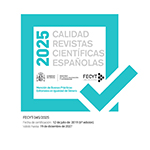La liberación de cautivos en la frontera de Granada (siglos XIII-XV)
Resumen
Castilla y Granada reconocían el derecho de los cautivos a buscar la salvación en la huída. Algunas fugas eran tan increíbles que se explicaban por la ayuda divina. Los rescates se pagaban con dinero procedente de legados testamentarios, limosnas y la ayuda oficial. Las rentas de bienes hábices garantizaban el pago de muchos rescates en el lado granadino. A veces los cautivos volvían a casa para reunir el dinero de su rescate, dejando a un miembro de su familia como rehén. Por razones religiosas, los moros preferían canjear cautivos en vez de rescatarlos. Los alfaqueques ponían en contacto a la familia del cautivo con el dueño de éste y procuraban que ambas partes llegaran a un acuerdo. Se esperaba de ellos que fuesen honestos, pero algunos aprovechaban su situación privilegiada para comerciar o espiar. Mujeres, niños y adolescentes recurrían a la apostasía para mejorar sus condiciones de vida. Pero esta opción era más traumática para los cristianos que para los musulmanesDescargas
Descarga artículo
Licencia
La revista En la España Medieval, para fomentar el intercambio global del conocimiento, facilita el acceso sin restricciones a sus contenidos desde el momento de su publicación en la presente edición electrónica, y por eso es una revista de acceso abierto. Los originales publicados en esta revista son propiedad de la Universidad Complutense de Madrid y es obligatorio citar su procedencia en cualquier reproducción total o parcial. Todos los contenidos se distribuyen bajo una licencia de uso y distribución Creative Commons Reconocimiento 4.0 (CC BY 4.0). Esta circunstancia ha de hacerse constar expresamente de esta forma cuando sea necesario. Puede consultar la versión informativa y el texto legal de la licencia.
La revista En la España Medieval no cobra por tasas por envío de trabajos, ni tampoco cuotas por la publicación de sus artículos.












